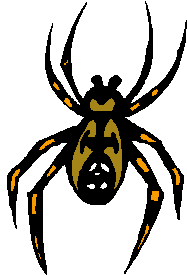|

(Click Here)

(Click Here)

(Click Here)
|
|

|
Spider
Day |
 |

Science
Lesson
for Spider Day
|
Objective:
The students will record facts about
spiders.
|
|
Materials
-
A
collection of nonfiction books and web sites on
spiders. See the Literature Suggestions and
Related Sites on the Spider
Home Page for ideas.
-
Eight
strips of paper per student, pair of students, or the whole class to record the spider facts.
(Whether they work individually, in pairs, or as a
class will depend on the level of the students.)
-
Two
circles of paper per student, pair of students, or
whole class to form the body and head of the spider.
|
|
Procedure
-
Depending
on the age of the students and the amount of resources
available, either read and share facts from the books
and web sites, or allow them to gather the information
on their own.
-
Direct
the students to gather 8 facts about spiders, either
individually, in pairs, or as a whole class.
Four of the facts should come from books, and four of
the facts should come from web sites.
-
The
students should record the facts on the strips of
paper (to act as spider legs). Younger students
may dictate facts to the teacher to be recorded on one
spider created by the whole class.
-
Once
the facts are recorded, the students may assemble
their spiders by attaching the legs, heads, and bodies
with either glue or tape.
-
If
time allows, have the students share their spider
facts with the rest of the class.
|
|
Other
Lesson Ideas
-
Have
the students observe real spiders. These may
either be brought in from home, collected outside on
the school grounds, or brought in by the teacher.
-
Have
a lesson on predators, prey, and the food chain.
-
List
how spiders are good for the environment.
-
Have
a lesson on names for young animals - spider -
spiderling, pig - piglet, cow - calf, etc.
-
Compare
arachnids to insects.
-
Have
a lesson on all the different types of spider webs.
-
Allow
the students to pick a type of spider and do some
research on that type.
|
|

|